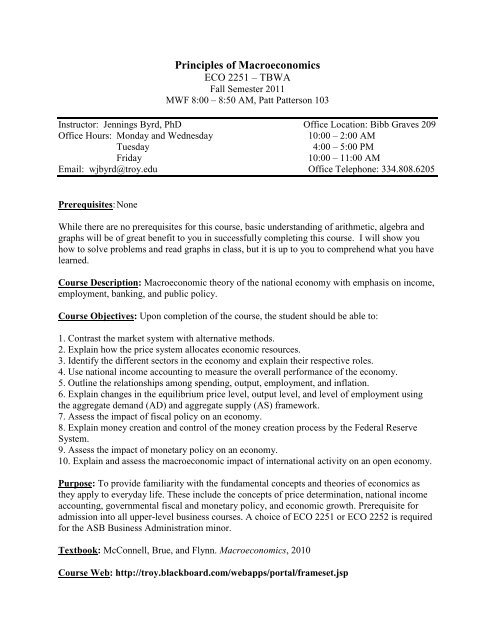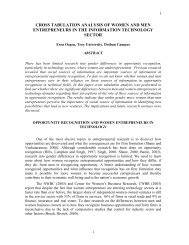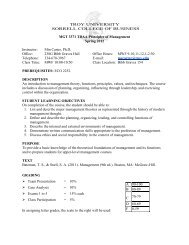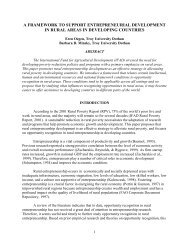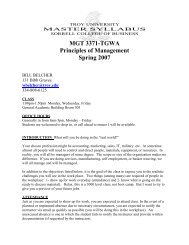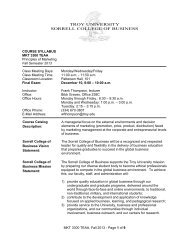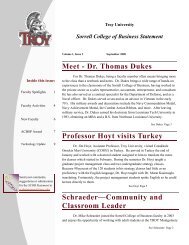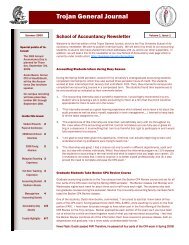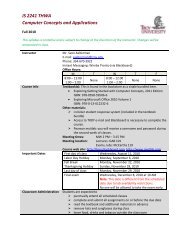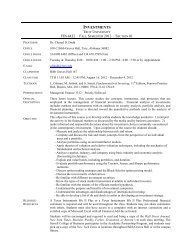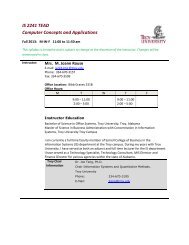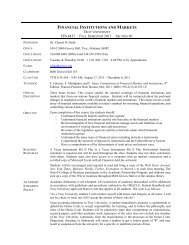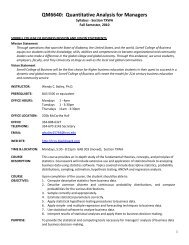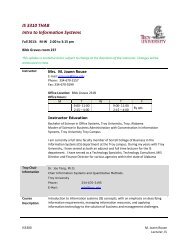Principles of Macroeconomics - Troy University
Principles of Macroeconomics - Troy University
Principles of Macroeconomics - Troy University
You also want an ePaper? Increase the reach of your titles
YUMPU automatically turns print PDFs into web optimized ePapers that Google loves.
<strong>Principles</strong> <strong>of</strong> <strong>Macroeconomics</strong>ECO 2251 – TBWAFall Semester 2011MWF 8:00 – 8:50 AM, Patt Patterson 103Instructor: Jennings Byrd, PhD Office Location: Bibb Graves 209Office Hours: Monday and Wednesday10:00 – 2:00 AMTuesday4:00 – 5:00 PMFriday10:00 – 11:00 AMEmail: wjbyrd@troy.edu Office Telephone: 334.808.6205Prerequisites: NoneWhile there are no prerequisites for this course, basic understanding <strong>of</strong> arithmetic, algebra andgraphs will be <strong>of</strong> great benefit to you in successfully completing this course. I will show youhow to solve problems and read graphs in class, but it is up to you to comprehend what you havelearned.Course Description: Macroeconomic theory <strong>of</strong> the national economy with emphasis on income,employment, banking, and public policy.Course Objectives: Upon completion <strong>of</strong> the course, the student should be able to:1. Contrast the market system with alternative methods.2. Explain how the price system allocates economic resources.3. Identify the different sectors in the economy and explain their respective roles.4. Use national income accounting to measure the overall performance <strong>of</strong> the economy.5. Outline the relationships among spending, output, employment, and inflation.6. Explain changes in the equilibrium price level, output level, and level <strong>of</strong> employment usingthe aggregate demand (AD) and aggregate supply (AS) framework.7. Assess the impact <strong>of</strong> fiscal policy on an economy.8. Explain money creation and control <strong>of</strong> the money creation process by the Federal ReserveSystem.9. Assess the impact <strong>of</strong> monetary policy on an economy.10. Explain and assess the macroeconomic impact <strong>of</strong> international activity on an open economy.Purpose: To provide familiarity with the fundamental concepts and theories <strong>of</strong> economics asthey apply to everyday life. These include the concepts <strong>of</strong> price determination, national incomeaccounting, governmental fiscal and monetary policy, and economic growth. Prerequisite foradmission into all upper-level business courses. A choice <strong>of</strong> ECO 2251 or ECO 2252 is requiredfor the ASB Business Administration minor.Textbook: McConnell, Brue, and Flynn. <strong>Macroeconomics</strong>, 2010Course Web: http://troy.blackboard.com/webapps/portal/frameset.jsp
Supplement Materials: 1) The following website contains additional prep materials such asstudy cards and practice quizzes.http://highered.mcgraw-hill.com/sites/0073365955/student_view0/index.html.2) To aid you in math and graph problems, I will post worked problems on blackboard forselected chapters.Quizzes: Quizzes will be given on a weekly basis. Each quiz will be based upon the previousweek’s lectures and are equally weighted. There will be a total <strong>of</strong> 14 quizzes. To remove anyuncertainty from the assessment, quizzes will generally be multiple-choice and consist <strong>of</strong> 10questions. I may have you solve a problem (calculation) here or there. In addition, to removemore uncertainty, quizzes will always be given on a Wednesday regardless if no class held onMonday. Some quizzes may be open note, meaning, yes; you get to use your notes to answerquestions. If you miss a quiz without an approved excuse you will receive a 0 for that quiz. Ifyou miss a quiz and have an approved excuse you will be given 1 week to make up the quiz. It’svery simple, you have up until the start <strong>of</strong> class to inform me you will not be there, but keep inmind your excuse needs to be legit.Drop Grade: I will drop the 2 lowest quiz grades prior to the final exam. In order for me to doso, YOU must, on the last day <strong>of</strong> class, bring a signed note stating that you want this option. Ifyou pursue this option, the remaining quiz grades are then recalculated so that they are equallyweighted. If you do not or choose not to pursue this option then all <strong>of</strong> your quiz grades will beincluded in your final grade.Homework: Homework assignments will be given throughout the semester. Most homeworkassignments will be given in an Excel file or as a multiple choice handout. I will assign selectedquestions from each Excel handout and will provide additional resources to accompany thehandout. In class, pending need, I will explain how to do certain aspects in the Excel file.Final Exam: All students who take this course must take a timed, proctored, comprehensive,closed-book/closed notes formative exam which will be taken in Blackboard during the finalexamination period. The exam must be worth 25% <strong>of</strong> the points <strong>of</strong> the course and the examresults may not be scaled. This exam will be administered online in Blackboard. All students,regardless <strong>of</strong> course format (online, lecture, or hybrid) will be registered in a separate course inBlackboard where this exam is accessed. The exam will cover all <strong>of</strong> the learning objectives listedin this master syllabus. The exam will be two hours in length and must be completed in onesitting. Students who exceed the time limit will have points deducted from their exam at the rate<strong>of</strong> 5% per minute.I have no control over the questions asked on the final exam! And yes, what you haveheard is correct.
Grading Policy: Quizzes 54%(14 total)Homework 21%(7 total)ComprehensiveFinal Exam 25%Grading Scale: A 90-100%B 80-89%C 70-79%D 60-69%F 0-59%Class Procedure: The method <strong>of</strong> delivery will be lecture. Students are encouraged toparticipate in lecture, but not have conversations about their life to other students while in class.Students are also expected to attend class and complete reading assignments. I like to use thestandard “chalk and talk” delivery, and ask a lot <strong>of</strong> questions. I have found that PowerPointdisengages students from the lecture and only serves to further the use <strong>of</strong> their imagination.Economics can be a subject <strong>of</strong> opinion. Economists have established basic principles to guideindividuals, firms, etc. to decisions and policies, but these are constantly being challenged. Iencourage you to think about what is covered in class and consider if it makes sense.Attendance Policy: You are your own free person. You have the capability to make your owndecisions and going to class is one <strong>of</strong> them. Since I am an economist, I should adhere to the veryprinciples I teach, which state why you should or should not attend class. Therefore, I will notforce you to attend class meaning I have no attendance policy. However, I ask that if you decideto attend class, be on time and prepared. Not doing so is rude to those who are in class and areprepared.General Supports: The computer labs in McCartha are available for student use.Additional Services: AMERICANS WITH DISABILITIES ACT: <strong>Troy</strong> <strong>University</strong> supportsSection 504 <strong>of</strong> the Rehabilitation Act <strong>of</strong> 1973 and the Americans with Disabilities Act <strong>of</strong> 1990,whiich insure that postsecondary students with disabilities have equal access to all academicprograms, physical access to all buildings, facilities and events, and are not discriminated againston the basis <strong>of</strong> disability. Eligible students, with appropriate documentation, will be providedequal opportunity to demonstrate their academic skills and potential through the provision <strong>of</strong>academic adaptations and reasonable accommodations. Students with disabilities, or those whosuspect they have a disability, must register with the Disability Services Coordinator in order toreceive accommodations. Students currently registered with the Disability Services Office arerequired to present their Disability Services Accommodation Letter to each faculty member atthe beginning <strong>of</strong> each term. If you have any questions, contact the Office <strong>of</strong> Adaptive NeedsProgram (Eldridge Hall), or call 670-3220/3221.
Cell Phones and Other Electronic Devices: Turn <strong>of</strong>f your cell phone or put it on vibrate, andDO NOT ANSWER A CALL. In addition, if texting and social networking are essential toyour life and you cannot be one minute without your phone, do not ask me to repeat somethingyou did not understand because you were texting while I was talking. As far as computers, manystudents use their computers to take notes. Note, while this is an acceptable form <strong>of</strong> note taking,this class makes use <strong>of</strong> many equations and graphs, which are more difficult to efficiently putinto a computer in a timely manner. This means that those <strong>of</strong> you who use a computer are likelydoing so to update your Facebook page, surf the internet, or work on another project. See myrule about texting when it comes to asking me questions.Incomplete Work Policy: See quiz make-up policy.Cheating Policy: Simply put, DON’T DO IT. If you are caught cheating your grade for thecourse will be an F. Consult Oracle on the policy <strong>of</strong> cheating.Dates <strong>of</strong> Interest: First day <strong>of</strong> class August 17Every Wednesday QuizFall break November 21-27Last day <strong>of</strong> class December 5Final examDecember 8, 8:00 AM(may be changed)Tentative Course OutlineIntroduction to Economics and the Economic Way <strong>of</strong> ThinkingCh. 1 Limits, Alternatives, Choices (and appendix)Ch. 2 The Market System and the Circular FlowCh. 3 Demand, Supply, and Market EquilibriumGDP and InstabilityCh. 5 An Introduction to <strong>Macroeconomics</strong>Ch. 6 Measuring Domestic Output & National IncomeCh. 8 Business Cycles, Unemployment, & InflationMacroeconomic ModelsCh. 9 Basic Macroeconomic RelationshipsCh. 11 Aggregate Demand and Aggregate SupplyCh. 16 Extending the Analysis <strong>of</strong> Aggregate Supply (Selected Parts)Macroeconomic PolicyCh. 12 Fiscal Policy, Deficits, and DebtCh. 14 Money CreationCh. 13 Money and BankingCh. 15 Interest Rates and Monetary Policy
Growth and International <strong>Macroeconomics</strong>Ch. 7 Economic GrowthCh. 17 The Balance <strong>of</strong> Payments, Exchange Rates, and Trade DeficitsCh. 16 Extending the Analysis <strong>of</strong> Aggregate Supply (Selected Parts)Ch. 4 The US Economy: Private and Public SectorsExtra CreditExtra credit is given at my discretion. If I do <strong>of</strong>fer extra credit, I have to give all students thesame opportunity (be it in assignments, attendance, etc.) This means I do not want you comingto my <strong>of</strong>fice at the end <strong>of</strong> the semester wanting extra credit to boost your grade. First this showsspecial interest. Secondly, and more importantly, I have heard <strong>of</strong> all kinds <strong>of</strong> ways to do extracredit and the most common way is to write a paper. To clarify, I do not want to read a paperbecause I have to do enough <strong>of</strong> that on my own.


